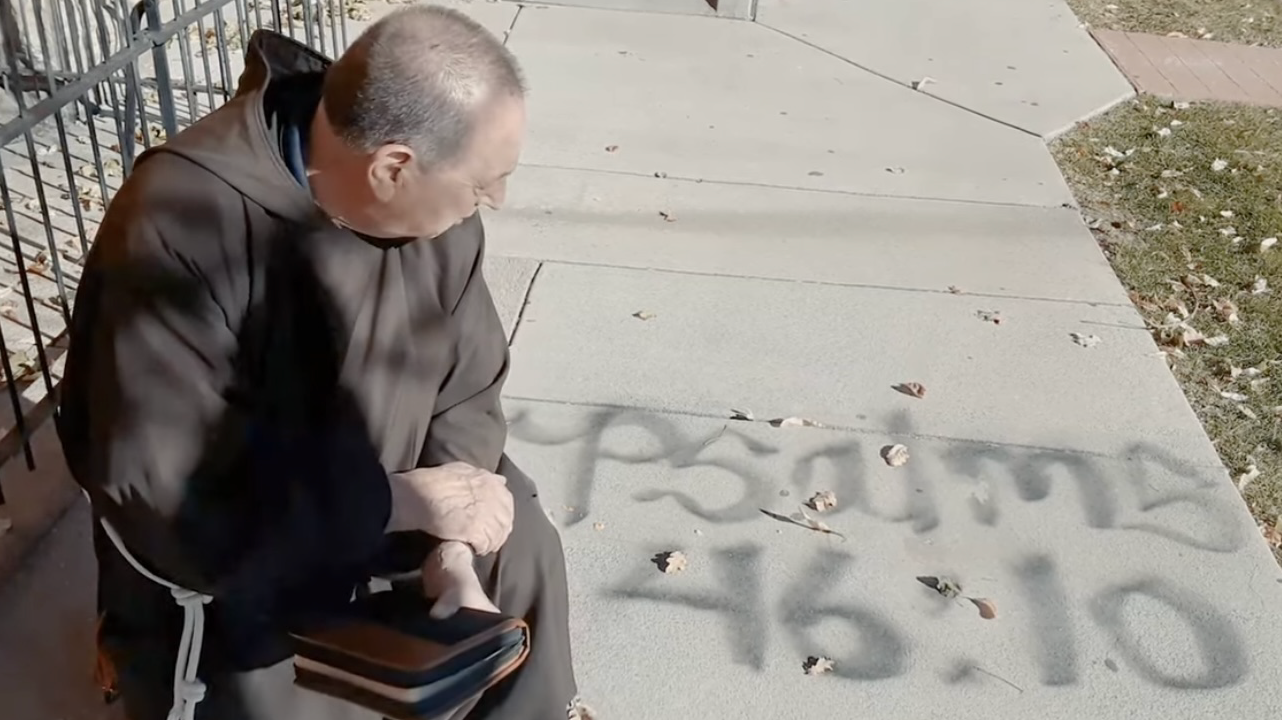Homebound/Nursing Home
If you, or a parishioner you know, is homebound and unable to come to church, the Sacraments of Penance and Reconciliation, of the Anointing of the Sick, and of Holy Communion may be brought to them at home.
Credits to “Busted Halo”on Youtube
“Is anyone among you sick? He should summon the presbyters of the church, and they should pray over him and anoint him with oil in the name of the Lord, and the prayer of faith will save the sick person, and the Lord will raise him up.” James 5:14-15
“By the sacred anointing of the sick and the prayer of the priests the whole Church commends those who are ill to the suffering and glorified Lord, that he may raise them up and save them. And indeed she exhorts them to contribute to the good of the People of God by freely uniting themselves to the Passion and death of Christ. As soon as anyone of the faithful begins to be in danger of death from sickness or old age, the fitting time for him to receive this sacrament has certainly already arrived. If a sick person who received this anointing recovers his health, he can in the case of another grave illness receive this sacrament again. If during the same illness the person’s condition becomes more serious, the sacrament may be repeated. It is fitting to receive the Anointing of the Sick just prior to a serious operation. The same holds for the elderly whose frailty becomes more pronounced.”
Catechism of the Catholic Church, 1499, 1514-1515
UNICIÓN DE LOS ENFERMOS
Enfermo en casa/Asilo
Creditos a “Católico Soy”on Youtube
“¿Está alguno enfermo entre vosotros? Llame a los ancianos de la iglesia, y oren por él, ungiéndole con aceite en el nombre del Señor. 15 Y la oración de fe salvará al enfermo, y el Señor lo levantará; y si hubiere cometido pecados, le serán perdonados.” Santiago 5:14-15
“Con la sagrada unción de los enfermos y con la oración de los presbíteros , toda la Iglesia entera encomienda a los enfermos al Señor sufriente y glorificado para que los alivie y los salve. Incluso los anima a unirse libremente a la pasión y muerte de Cristo; y contribuir, así, al bien del Pueblo de Dios”, “La Unción de los enfermos “no es un sacramento sólo para aquellos que están a punto de morir. Por eso, se considera tiempo oportuno para recibirlo cuando el fiel empieza a estar en peligro de muerte por enfermedad o vejez. Si un enfermo que recibió la unción recupera la salud, puede, en caso de nueva enfermedad grave, recibir de nuevo este sacramento. En el curso de la misma enfermedad, el sacramento puede ser reiterado si la enfermedad se agrava. Es apropiado recibir la Unción de los enfermos antes de una operación importante. Y esto mismo puede aplicarse a las personas de edad edad avanzada cuyas fuerzas se debilitan.”
Catecismo de la Iglesia Católica, 1499, 1514-1515
ANOINTING OF THE SICK
Homebound/Nursing Home
If you, or a parishioner you know, is homebound and unable to come to church, the Sacraments of Penance and Reconciliation, of the Anointing of the Sick, and of Holy Communion may be brought to them at home.
Credits to “Busted Halo”on Youtube
“Is anyone among you sick? He should summon the presbyters of the church, and they should pray over him and anoint him with oil in the name of the Lord, and the prayer of faith will save the sick person, and the Lord will raise him up.” James 5:14-15
“By the sacred anointing of the sick and the prayer of the priests the whole Church commends those who are ill to the suffering and glorified Lord, that he may raise them up and save them. And indeed she exhorts them to contribute to the good of the People of God by freely uniting themselves to the Passion and death of Christ. As soon as anyone of the faithful begins to be in danger of death from sickness or old age, the fitting time for him to receive this sacrament has certainly already arrived. If a sick person who received this anointing recovers his health, he can in the case of another grave illness receive this sacrament again. If during the same illness the person’s condition becomes more serious, the sacrament may be repeated. It is fitting to receive the Anointing of the Sick just prior to a serious operation. The same holds for the elderly whose frailty becomes more pronounced.”
Catechism of the Catholic Church, 1499, 1514-1515
UNICIÓN DE LOS ENFERMOS
Enfermo en casa/Asilo
Creditos a “Católico Soy”on Youtube
“¿Está alguno enfermo entre vosotros? Llame a los ancianos de la iglesia, y oren por él, ungiéndole con aceite en el nombre del Señor. 15 Y la oración de fe salvará al enfermo, y el Señor lo levantará; y si hubiere cometido pecados, le serán perdonados.” Santiago 5:14-15
“Con la sagrada unción de los enfermos y con la oración de los presbíteros , toda la Iglesia entera encomienda a los enfermos al Señor sufriente y glorificado para que los alivie y los salve. Incluso los anima a unirse libremente a la pasión y muerte de Cristo; y contribuir, así, al bien del Pueblo de Dios”, “La Unción de los enfermos “no es un sacramento sólo para aquellos que están a punto de morir. Por eso, se considera tiempo oportuno para recibirlo cuando el fiel empieza a estar en peligro de muerte por enfermedad o vejez. Si un enfermo que recibió la unción recupera la salud, puede, en caso de nueva enfermedad grave, recibir de nuevo este sacramento. En el curso de la misma enfermedad, el sacramento puede ser reiterado si la enfermedad se agrava. Es apropiado recibir la Unción de los enfermos antes de una operación importante. Y esto mismo puede aplicarse a las personas de edad edad avanzada cuyas fuerzas se debilitan.”
Catecismo de la Iglesia Católica, 1499, 1514-1515


